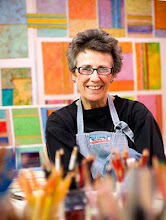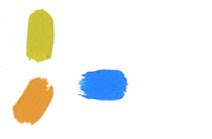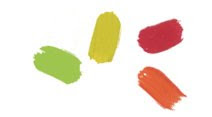"To abstract is to trade a loss of reality for a gain in control."
James Moffett, The author of the quote, a teacher and scholar, is speaking of abstraction as less than real. My dictionary defines abstraction thusly: “existing in thought or as an idea but not having a physical or concrete existence”. That led me to thinking that abstraction in visual art is in fact real, not an abstraction at all. It is usually made of solid materials that can be seen, photographed, touched (not in a museum of course; my daughter once caused alarms to go off at the Metropolitan). Abstract thought is a horse of a different color. But, of course, it can usually be written. Along with most other kinds of thought.
The kind of work I do, abstract, minimal, color-field — call it what you will, has far fewer fans than landscape, still life or other forms of representational art. It is for that reason that I write about it. I believe that we, myself included, form an idea early on, of what a painting looks like. It was difficult for me to break away from those confines. The later learning about “foreground and background” and “negative space” were obstacles in the path I needed to take to be able to make a painting about — here I have to stop and think. A painting about what? My paintings or those of other artists whose work I love, what are they about? Shape, color, paint, texture: not particularly interesting. Put them together to realize some intention of the mind’s eye and, voila! an object that can move us to tears of joy or sadness, or delight our senses. How does that happen? Damned if I know. But it is the artist that we meet when we hear or read or see the results of his/her labors.
I am reading Great House now by Nicole Krauss. There’s a monologue of an aging father imagining himself speaking to his alienated middle-aged son; it puts emotional pain into words that can be felt intensely. When my children were small, we had on the dining room wall Little Girl in Blue, a sad-faced child by painter Amadeo Modigliani . When I was away for a teachers’ conference Barbara was heard to say, wistfully: “Her mother is in MIami.” I don't know why we choose to feel all that. Maybe because feeling anything is how we know that we are alive.
Well, there, I did it again. Just got carried away. I apologize to those who prefer shorter readings. I will mend my ways. In the meantime feel free to stop anywhere. And to those of you who stay with me, much obliged. I enjoy the company.
To close, here’s Garrison Keillor: “I believe in looking reality straight in the eye and denying it.”
The image above is History 001, 2010, giclée print, size varies. To read about the giclée process and this series, or to purchase an original giclée print, CLICK HERE.














Please don't mend your ways. I like your posts.
ReplyDeleteI can't remember where I heard it--maybe it was even in a movie?!-but I once heard someone trying to explain an abstract painting to someone who thought he didn't like abstracts. The doubter was told to just stand in front of the painting, mind clear, don't think about it--just let it wash over you. How does it make you feel? And the person actually learned to appreciate the work and feel moved by it, once he was given permission to just look and experience, rather than judge.
My first art teacher, in high school, was someone who thought Art had to be a landscape or a still life. I remember one pen and ink I did that was of a hand holding a credit card (pretty representational, no?). She told me that my technique was good, but my subject matter wasn't art. She managed to convince me that the sorts of things I liked to do weren't really art-worthy. That was the end of my formal art education until after I got a college degree in something else, even though I was obsessed with doing creative things and had spent nearly every spare minute I had painting and making collages. It's good to explain why it's ok to look and experience, rather than avoid due to preconceived biases.
And I suppose this is way too long a comment....tsk...
Thank you, P.C. No, not too long. But sad. I had a similarly devastating experience with math in grade school. At that point it was probably called arithmetic and about some simple operation. I was thoroughly scarred by a teacher who thought that I had cheated my way to the answer. I imagine that sort of experience is not uncommon. Too bad.
ReplyDeleteYour subject matter wasn't art? Gee, whiz. How could you?
Joan,
ReplyDeleteYour posts are never too long for me. In fact I hope that you will continue in this abstraction vein for many more posts. Your musings are rich in an area where I don't find a lot of satisfying writing.
Thank you for caring to write,
Rebecca
Thank you, Rebecca. I'll take all the support I can get. I actually didn't believe myself when I wrote that comment about shorter readings. Who did I think I was fooling?
ReplyDelete